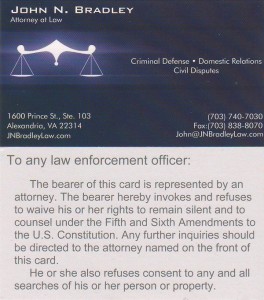Due to popular demand, my next post will be about why I always tell people how important it is to NOT speak to police. Or, to put it bluntly, “Why you need to shut the f*** up.”
I’m using this week’s post to set up what I’m going to say next week, because there’s really too much to say in one post.
So first:
When To Talk.
So first, I want to preface the whole thing by saying that the advice “Don’t talk to police” really applies to situations where police start the questioning. This means traffic stops, investigations, any time you’ve been arrested, any time you think you’re likely to be arrested, and any time a police officer would like to “ask you a few questions.” I won’t go so far as to say it’s impossible to get yourself in trouble when reporting a crime, but it’s not something I’ve really seen.
If you’ve been a witness to a serious crime, or worse, a victim, report it. I mean that to refer to all serious crimes, from burglary to a felonious assault. But I’m particularly adamant about it regarding crimes of sexual assault. The Justice Department’s National Crime Victimization Survey (p.4) suggests that two-thirds of sexual assault crimes go unreported. I personally believe the true number is much higher, for two reasons. One, a survey like this can only count people willing to admit, in a survey, that they didn’t report something they think they should have. And two, the vast majority of people who’ve told me (both personally and professionally) about being sexually assaulted themselves never reported the assault. One of those is a fault with statistical surveys in general, and the other is by no means objective, so I can’t cite to anything wrong with the Department’s study. But my personal belief is that it’s more like ninety percent that go unreported. And if advising people not to speak to police has the effect of scaring victims out of reporting crimes, then I’ve done my readers a disservice.
One of biggest reasons given for not reporting crime is that the victims believe they might get in trouble. I wish I could guarantee you that this won’t happen, but I’m sure that somewhere, someone has had it happen to them. I can offer the assurance that I’ve seen a lot of cases, and the only times I’ve seen the “victim” of a crime prosecuted in connection with the case they reported were when someone reported being the victim of a crime, and then tanked the case when it came time for trial (this happens most often in domestic assault cases). Still, in the cases I’ve seen, the person was charged with the lesser (misdemeanor) crime of filing a false report, rather than the more serious (and potentially more accurate) felony of perjury. Prosecutors also understand that life isn’t always easy; they also don’t appreciate having their time wasted.
There are two main reasons why people who report they are victims of crimes, even if they do admit they did something wrong, don’t usually get charged. The first is that police, and prosecutors, are human. If you report to an investigator that you were sexually assaulted at the end of a date, and you mention (for the sake of full disclosure, and because you know that it’ll look worse if it comes out as a surprise) that both you and your attacker got high earlier in the night, it takes a true asshole to try to jam you up for a petty misdemeanor while you’re standing up to a sexual predator. Sometimes, regrettably, such people do find careers in law enforcement. But really, not that many.
But the second, bigger reason why it’s generally OK to talk to police when you’re reporting a crime—especially when you’re the victim—is the same reason why you shouldn’t talk to them when they come asking questions. Law enforcement has, at its heart, two jobs—catching bad guys, and protecting citizens. When they come to you—because of a traffic stop, investigating a case, or serving a warrant, they’re looking for a bad guy. That doesn’t mean they’ll always find one, but that’s what they’re looking for, and they tend to get a form of tunnel-vision. Bad guys is what they’re looking for, and bad guys is what they tend to see.
But if you come to them (by calling 911, filing a report, etc.), then you establish yourself as a citizen looking for help, and they’re very likely to treat you as such. Honestly, I’ve seen some really shaky cases get prosecuted, just because the complaining witness told their story first. If you have genuinely been the victim of a crime, the police really do want to help you.
So, that’s the public service portion of this message. Tune in—oh, sometime in the next fortnight or so—to find out why you should never, ever, ever try to talk your way out of a ticket, and why we refer to the classic line, “I’ll just explain to the officer, I’m sure he’ll understand, as “Prelude to a Confession.”
